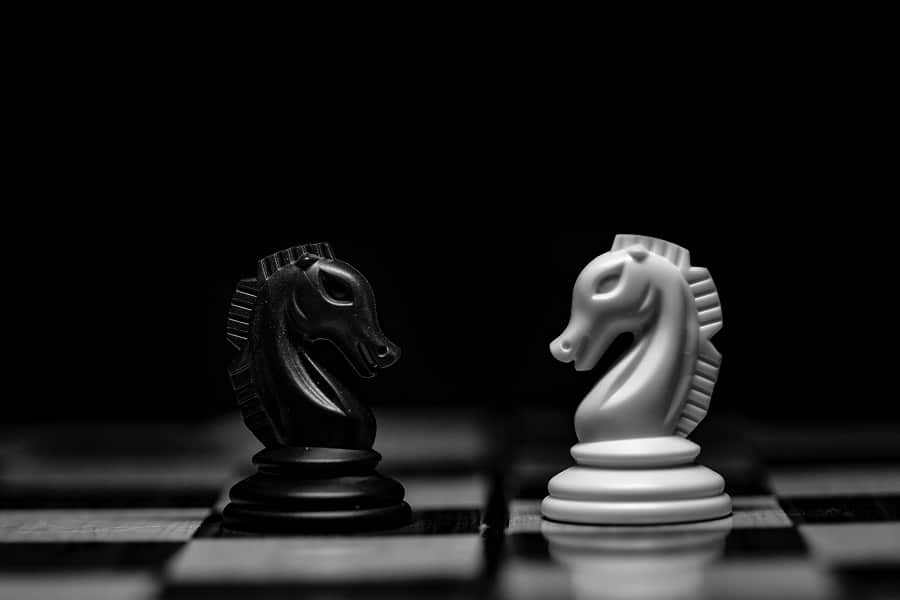
The Game Trope
Cortney Donelson
As readers, the language of writing can sometimes get sticky. Who cares what a hyperbole is? What does it matter if that -ing verb is a gerund or a present participle? And what do those things even mean?
As fiction readers, though, we understand themes … and even if we don’t know it, we understand tropes. We get what’s required for a murder mystery (I see dead people) or a romance (You complete me). In thrillers, specifically, we sense the threads being pulled through the story—the ones drawing us closer and closer to the climax as we await the ultimate suspense or surprise: the heart-thumping action scene that drowns out the reality around us or the plot twist that causes us to drop the book into our laps and stare at the wall. These threads are the tropes.
Tropes have gotten a bad reputation because they can be mistaken for clichés and other figurative language strategies, such as metaphors. While clichés—overused or predictable phrases—should be avoided because they show a lack of creativity, tropes are tools writers use to enhance a story. But again, who cares about those fancy word-nerd issues? That stuff is for the school teachers and editors, the grammarists.
For our purposes, we might think of tropes as the foundational elements of storytelling. They help set (and hopefully fulfill) the expectations we readers have for a particular genre. Readers want suspense and intrigue in thrillers, right? Of course we do. Tropes are those common situations or entities that help structure the thrillers we love to read.
Thriller authors choose from a variety of tropes to meet our expectations. To list a few examples, there’s the isolated setting—think Agatha Christie’s And Then There Were None, which I recently re-read (so good). Or there is the high-IQ psychopath or the seductively sinful female, commonly called the femme fatale. Often in thrillers, authors use the deadline trope. Pick any legal, crime, or spy thriller, and you’ll see what I mean. Three … two … one! BOOM!
One of the most intriguing tropes authors might use in their novels is the game. This trope is easy to spot in movies. In The Game with Michael Douglas or the comedic thriller (isn’t that an oxymoron?) Game Night with Jason Bateman, the writers pit their characters in literal games to navigate the plot. In books, the game trope can be subtle or—like in these movies that use the word game in their titles—overt (e.g., Ready Player One by Ernest Cline).
Games come in many forms. There are literal uses, as with weaving classic board games (like Clue!) or puzzles, riddles, and code-breaking into the storyline. Perhaps the most suspenseful, though, are the psychological games, where authors twist “play” into something more sinister, coaxing an emotional outpouring from readers. Like an eel slithering through murky water, psychological games play (pun always intended!) with not only the protagonists’ minds, but with readers’ minds too. When there are games in thrillers, something we saw as innocent in our youth can become dreadful, confusing, even evil. Suddenly, the safety from our childhood is gone, and we’re left fighting an inner emotional battle. What was once good (game-playing) is now bad (mental and emotional torment). But is it really bad? The conflict continues because we seek out these thrillers; after all, the entertainment factor still stands firm. Even war can be positioned as a game trope—think strategy games, like chess or battleship.
It’s not just the game and its solution that make the best novels worth reading. Equally compelling are the relationships and interactions of the characters and the unique worlds in which they live, both of which animate the games and bring them to life. Inside relationships is where most psychological games occur. Trust becomes betrayal; love becomes addiction, and life dies.
Finally, the art of the hunt in the thriller novel caps the game trope. Whether killers are hunting their next victims, detectives are hunting for clues, saviors are hunting for morals, or readers are hunting for satisfying conclusions, the hunt wraps suspense like a gift, packaged for eager readers of the thriller genre.
When done skillfully, the game trope will make us reach for our favorite thrillers over and over again. First to be entertained. Then to uncover the early hints the author may have left to the games’ solutions, which we missed the first time around.
Examples of Books That Use the Game Trope
- The Clue series, an 18-book series of children’s books published throughout the 1990s (based on the board game Clue).
- The Hunger Games series by Suzanne Collins (twisted sport/games for survival)
- The DaVinci Code by Robert Langdon (code-breaking)
- The Guest List by Lucy Foley (a puzzle)
- Fight Club by Chuck Palahniuk (combat, pseudo-sport)
- Forfeit, by Dick Francis (horse racing)
- The Silence of the Lambs by Robert Harris (the ultimate psychological game)
- Midnight in the Bright Ideas Bookstore by Matthew Sullivan (code-breaking)
- The Games by James Patterson and Mark Sullivan (the Olympic games)
- The Inheritance Games [YA Series] by Jennifer Lynn Barnes (riddles and puzzles)
Whether you understand when to use “who” or “whom” in a sentence, we can all appreciate how the game trope in thrillers only enhances the suspense, keeping us continually seeking to experience the newest and greatest psychological game or strategical maneuver as we cozy up with our favorite hot beverage. But not too hot. You know, in case the twist or drama makes us want to chuck something across the room or jump under our “blankies.”
About the Author
Cortney Donelson owns vocem LLC, a writing services business that offers ghostwriting and editing to writers with ideas and stories that will change the world. She has three books with her name on them: a memoir, a faith-based book, and her debut novel, a mystery inspired by MONOPOLY and called The Billionaire’s List, which was released in November 2022. She lives in the Charlotte, North Carolina, area with her family and when not writing or editing, enjoys paddle boarding and hiking. For more information, visit www.yourvocem.com.

More Thriller Features
Political Thriller Protagonists
What are the qualities of a good protagonist in a political thriller?
Spy Thriller Villains
Unraveling the Bad Guys of Espionage Fiction
Political Thrillers for Independence Day
4th of July Political Thrillers



